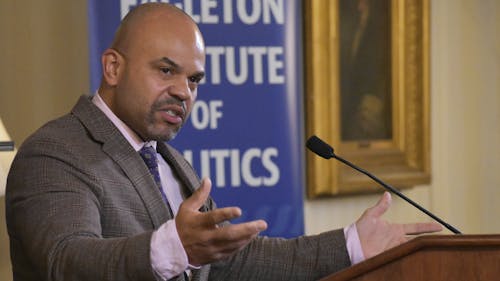Controversy around NYC bridge takes center stage at Eagleton lecture

More than 50,000 people have signed an ongoing petition to return the Mario M. Cuomo Bridge to its original name: the Tappan Zee Bridge.
Amid the recent pushback by New Yorkers regarding the New York State Legislature’s decision to designate the Tappan Zee Bridge replacement as the Mario M. Cuomo Bridge, Rutgers Associate Professor in the Department of Political Science and Senior Scholar at the Center on the American Governor Saladin Ambar, took a sympathetic but unromanticized look at the legacy of the 52nd Governor of New York.
The Eagleton Institute of Politics welcomed students, faculty and members of the public on Monday evening to a book talk for Ambar’s most recent work, “American Cicero: Mario Cuomo and the Defense of American Liberalism.”
An extensively researched biographic profile, Ambar’s book is the first to examine the entire political career of former democratic New York Gov. Mario Cuomo (D-N.Y.). The research for the book involved several trips to Italy to interview members of the Cuomo family, said Ruth Mandel, director of the Eagleton Institute of Politics, in her introduction of the event.
Born to an Italian mother and a Black father, Ambar grew up in Flushing, Queens. Cuomo, a native of Queens as well, was born to Italian immigrants who owned a grocery store in the Jamaica neighborhood, he said.
“In many ways, my childhood mirrored Cuomo’s rise in politics,” Ambar said.
For the audience, Ambar chronicled Cuomo’s rise to prominence in the New York political sphere, beginning as a young graduate from St. John’s University School of Law who worked as a mediator.
Ambar said that in 1972, Cuomo was asked to negotiate a deal between the residents of the predominantly Jewish neighborhood of Forest Hills, and low-income, mostly Black, citizens who were looking to move into the neighborhood.
“Cuomo, who was neither Black nor Jewish, was thrust in as a trusted neutral ethnic broker ... He created a crack into that community and allowed for it to begin the process of desegregation in ways that it heretofore had not,” Ambar said.
Indeed, two years later in 1974, Ambar moved into that very neighborhood to live with his mother and Sicilian grandmother.
“Cuomo would go on to become my governor during my middle school and my high school years as my mother and I moved from food stamps to working wages,” Ambar said, adding that growing up, he felt as though the former governor was fighting for him and those like him.
Ambar, for whom racial identity was an important part of growing up, added in his presentation that he believes all research is ultimately personal in some way. Previously, Ambar wrote a book in 2014 entitled, "Malcolm X at Oxford Union: Racial Politics in a Global Era."
Malcolm X meant a great deal to him and this dimension of his life involved the Muslim experiences he had during his teen years, Ambar said.
But now fascinated by Cuomo’s Catholic political thought and his Italian experience, “it was time to come to the Italians,” he said.
Ambar said that two years after Ronald Reagan was inaugurated as president and became the political force of the age, Cuomo came to power as New York’s 52nd governor and the nation's first elected Italian-American governor.
“It’s funny, because in many ways, even as I experienced him then and as I experience him now, Cuomo was an anti-hero, a critical voice of the then-growing — and soon prevailing — voice of American conservatism,” Ambar said.
During his talk, Ambar shed light on Cuomo’s many successes: in 1984 New York became the first state to enact a mandatory seat belt law, he redirected state resources to education and healthcare and during his first year in office he established the New York State Department of Health Aids Institute, he said.
Having lost his own father to AIDS, Ambar added — in another allusion to the personal nature of research — that he could only wonder whether his father would be alive today “if other politicians had had the courage of Cuomo.”
Ambar particularly emphasized Cuomo’s powerful oratorical ability, with which he reached out to all groups with “authenticity and power.” This was a skill which Ambar said resonated as something of great importance in Cuomo’s time.
In his presentation Ambar drew parallels between Cuomo and Cicero, a Roman politician and lawyer during the life of Julius Caesar.
“As Cicero reflected a broad antipathy to caesarism and the politics of his day, (which) reflected a shift from republicanism to empire, so too did Cuomo’s time in Albany represent a language of democratic virtue, calling us to pull away from the politics of corporations over people, tax breaks over school lunches and racial demonization over human understanding in what he liked to call ‘the great mosaic of New York and America,’” he said.
Ambar said that President Donald J. Trump is said to speak to the interests of the white working class like no other politician has done, but "he does not call them to something higher than their fears."
Whereas in his speeches, Cuomo too acknowledged the fears of his constituency, he also “pushed them for something more.”
The book talk also addressed Cuomo’s highly-speculated decision not to run for president in 1992, and his declination of a Supreme Court appointment from former President Bill Clinton.
There were levels of power which Cuomo was uncomfortable seeking, Ambar said.
By electing not to run, and declining these routes to power, “Mario Cuomo became something greater in the exchange: a great lesson for all us in these times, when the urge for power most decidedly trumps all,” Ambar said.



